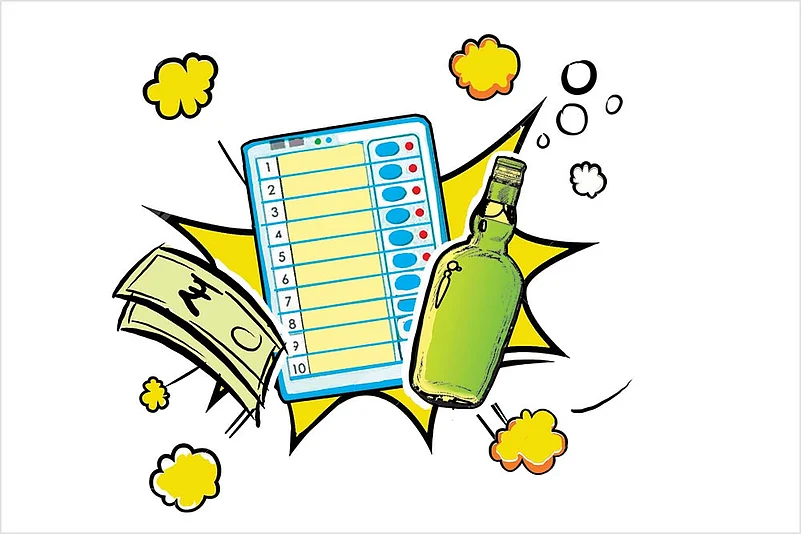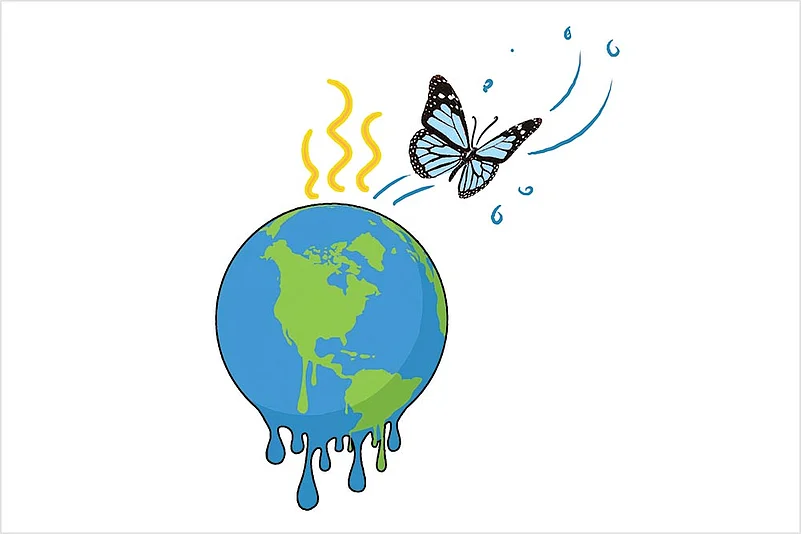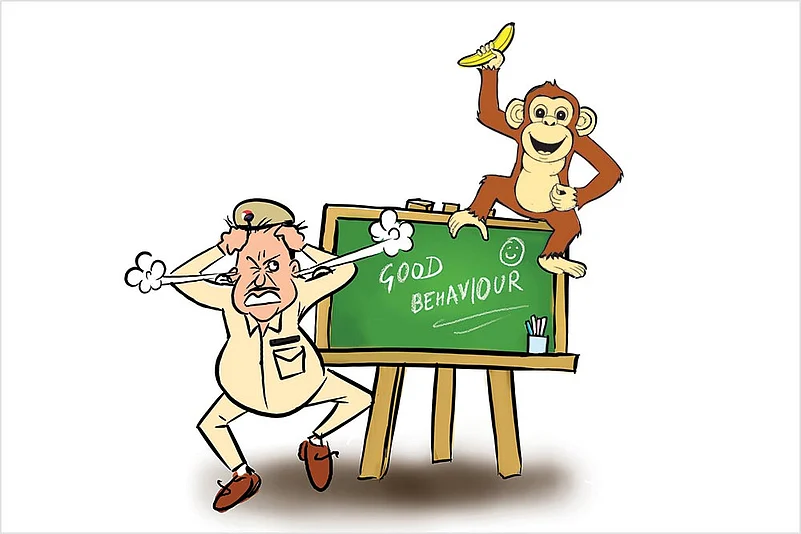May I Come In Miss Monkey?
Enough is enough, said the good folk of Punjab. Tired of monkeys marauding their crops, bathing in their water tanks and getting touchy feely on streets, they decided to end the problem once and for all—by establishing a simian school. There, “rogue monkeys” will learn “good-behaviour training” to make them less of a nuisance. After they pick up proper etiquettes, they might also be released into the wild. But where are they going to find teachers for the primates? Perhaps they could hire the police officer from Pilibhit who patiently perused his files as a rhesus macaque perched on his shoulder and combed his hair for lice. Regardless, the Punjab government is not new to monkey businesss—about 15 years ago, it used to run a primate prison in Patiala.

Choice Choice Baby
The ballot paper for the November presidential elections in Sri Lanka is bigger than a baby—two feet and two inches. Around three dozen candidates, a record for the country, are responsible for the exceptionally long sheet. Padded with symbols of the contestants and their names in three languages—English, Sinhala and Tamil—it is a mighty impressive scroll. The excess paper, however, will cost an additional $6 million, forcing the election commission to revise the outlay for the polls from $22 to $28 million. It might seem rather profligate, but it’s nowhere close to the estimated $7 billion India’s election cost.

Playing With The Razor’s Edge
‘Scientific’ studies say that beards not only make you look hotter, they also protect you from UV rays and dust. Perhaps that’s why women, hippies and hipsters love them. However, nobody is as dedicated to their preservation as Pakistani officials. Recently, officers in Khyber Pakhtunkhwa imposed a penalty of Rs 5,000 on barbers who trimmed their customers’ facial hair. Media reports say that they were detained and fined as a local traders’ union considers the practice un-Islamic, but we wonder if it was premature rehearsal for #NoShaveNovember.

Politicians’ Purse Strings In EC’s Knot
Pity the aspiring MLA. The Election Commission has not only refused to raise the expenditure limit of Rs 28 lakh for a candidate, it has also capped the amount which they can spend on each item. So now the most they can lavish on a face mask and cup of tea is Rs 5 and Rs 11 respectively. A vegetarian thali can be bought for Rs 80 and a deluxe meal for a generous Rs 120! The list also includes price caps on crackers, shawls, bouquets, red carpets, chairs and table fans. While the Election Commission’s thoroughness is commendable, considering how voters are swayed under the table, it is surprising that it has left out some of the biggest expenses—fermented brews and monetary inducements.
Miss Kohima’s Cattle Class
There is no dearth of sylphs on stage who seek to end poverty, help starving kids in Africa or give Botoxed lip service to world peace. But such pedestrian responses would not do for Vikuonuo Sachu, a contender for the Miss Kohima title. When asked what she would say to PM Modi if she were to meet him, she replied, “I would tell him to focus on women instead of cows.” Quite the riposte considering the crown’s at steak! But for (or because of?) all her wit and aplomb, Sachu was the second runner-up in the contest. We wonder what beef the pageant organisers have with brainy beauties.

Bye, Hi, Butterfly
Arhopala ganesa ganesa seems to be feeling the heat lately. Like many residents of Uttarakhand, the butterfly has been seeking newer, more favourable climes. Usually found at altitudes between 1,300 m and 2,400 m, it was recently spotted in Askot wildlife sanctuary—at an elevation of 3,577 m! But it’s not some lone ranger lost in the woods. Across the Himalayas, butterflies and moths have moved their habitats uphill. Scientists have termed this dislocation a “cause for concern”. The culprit, though, is rather familiar by now—climate change.
Cash, Card Or Plastic?
Students of Akshar School in Guwahati are laying yet another brick in the wall—one that Pink Floyd would probably approve of. At the “green” school, education is free and pupils have to deposit plastic waste instead of fees. However, when parents didn’t adopt the new currency, the school made it mandatory for students to bring plastic at least once week. The school compresses the waste inside PET bottles, which can be used as bricks for construction.

Fuel To The Fire
Indigenous people are considered to be among the passive section of the populace in most countries across the world. However, this is far from the truth for those in Ecuador. Having thrown out three presidents in the past decades, an indigenous people-led movement succeeded in bringing incumbent Lenin Moreno to his knees, forcing him to agree to restore fuel subsidies to end the mass protests that had brought capital Quito to a standstill.
The agreement was reached on October 13 after the two sides held talks brokered by the UN and the Roman Catholic Church. The protests began after the government announced stopping fuel subsidies as part of public spending cuts agreed with the IMF in return for a $4.2 billion loan. The deal reached in March will allow Ecuador to borrow money to tide over an economic crisis.
Moreno had announced that the fuel subsidies, introduced in the 1970s with an annual cost of $1.3 billion, were no longer affordable. Eliminating them was part of his plan to ease Ecuador’s debt burden. But the cut spiked petrol prices and sparked violent street protests. Demonstrators set up barricades, stormed buildings and clashed with security forces, who tried to disperse the crowds with tear gas.
Traditionally a farming country, Ecuador’s economy transformed after the 1960s with the growth of industry and the discovery of oil. There was rapid growth and progress in health, education and housing. But flagging oil prices and slowdown of the global economy affected Ecuador.
The talks were broadcast live on state television—in accordance with the indigenous leaders’ condition and came after nearly two weeks of violent demonstrations. Moreno had imposed a curfew through the military. The protest leaders in the negotiating room applauded, while Moreno gave no response.
This is undoubtedly a blow for him. Decree 883 was the main issue which prompted people to take to the streets in the first place and the president had repeatedly said there would be no going back on it. “Conceding is not losing,” a government official said in an attempt to put up a brave front. “Here we are all conceding.”
Illustrations by Saahil; Text Curated by Alka Gupta


























